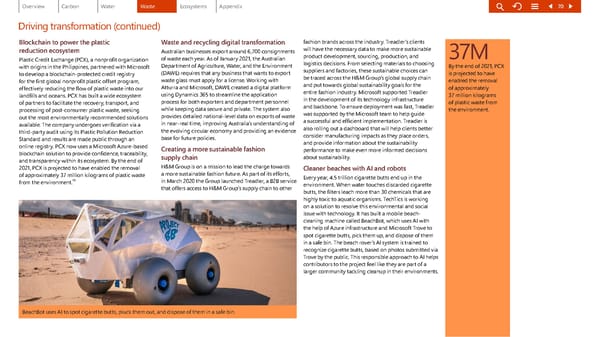Driving transformation (continued) Blockchain to power the plastic reduction ecosystem Plastic Credit Exchange (PCX), a nonprofit organization with origins in th e Philippines, partnered with Microsoft to develop a blockchain-protected credit registry for the first globa l nonprofit plastic offset program, effectively reducing the flow of plastic waste into our landfills and oceans. PCX has built a wide ecosystem of partners to fac ilitate the recovery, transport, and processing of post-consumer plastic waste, seeking out the most environmentally recommended solutions available. The co mpany undergoes verification via a third-party aud it using its Plastic Pollution Reduction Standard and results are made public through an online registry. PCX now uses a Microsoft Azure-based blockchain solut ion to provide confidence, traceability, and transparen cy within its ecosystem. By the end of 2021, PCX is projected to have enabled the removal of approximately 37 million kilograms of plastic waste from the environment. 10 Waste and recycling digital transformation Australian businesses export around 6,700 consignments of waste each year . As of January 2021, the Australian Department of Ag riculture, Water, and the Environment (DAWE) requires that any business that wants to export waste glass must apply for a license. Working with Atturra and Microsoft, DAWE created a digital platform using Dynamics 365 to streamline the application process for both exporters and department personnel while keeping data secure and private. The system also provides detailed national-level data on exports of waste in near-real time, improving Australia’s understanding of the evolving circular economy and providing an evidence base for future policies. Creating a more sustainable fashion supply chain H&M Group is on a mission to lead the charge towards a more sustainable fashion future. As part of its efforts, in March 2020 the Group launched Treadler, a B2B service that offers access to H&M Group’s supply chain to other fashion brands across the industry. Treadler’s clients will have the necessary data to make more sustainable product development, sourcing, production, and logistics decisions. From selecting materials to choosing suppliers and factories, these sustainable choices can be traced across the H&M Group’s global supply chain and put towards global sustainability goals for the entire fashion industry. Microsoft supported Treadler in the development of its technology infrastructure and backbone. To ensure deployment was fast, Treadler was supported by the Microsoft team to help guide a successful and e fficient implementation. Treadler is also rolling out a da shboard that will help clients better consider manufacturing impacts as they place orders, and provide information about the sustainability performance to make even more informed decisions about sustainability. BeachBot uses AI to spot cigarette butts, pluck them out, and dispose of them in a safe bin. Cleaner beaches with AI and robots Every year, 4.5 trillion cigarette butts end up in the environment. When water touches discarded cigarette butts, the filters l each more than 30 chemicals that are highly toxic to aq uatic organisms. TechTics is working on a solution to resolve this environmental and social issue with technology. It has built a mobile beach- cleaning machine called BeachBot, which uses AI with the help of Azure infrastructure and Microsoft Trove to spot cigarette butts, pick them up, and dispose of them in a safe bin. The beach rover’s AI system is trained to recognize cigarette butts, based on photos submitted via Trove by the public. This responsible approach to AI helps contributors to the project feel like they are part of a larger community tackling cleanup in their environments. 37M By the end of 2021, PCX is projected to have enabled the removal of approximately 37 million kilograms of plastic waste from the environment. 70
 Environmental Sustainability Report | Microsoft Page 69 Page 71
Environmental Sustainability Report | Microsoft Page 69 Page 71